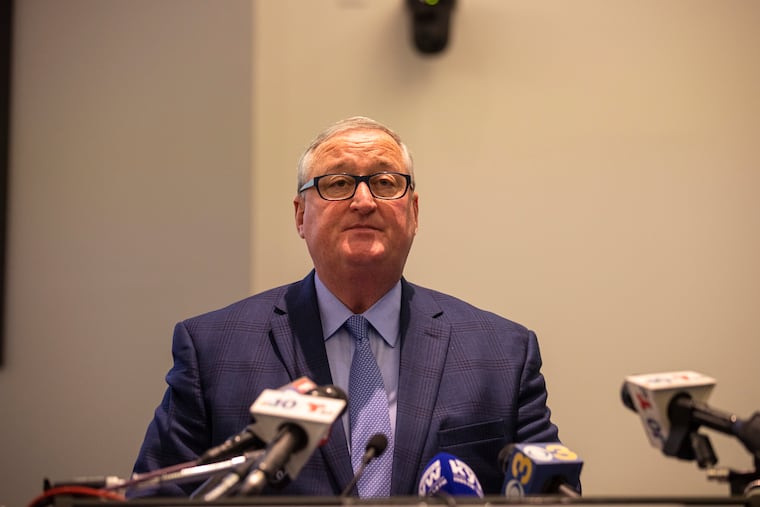Philly’s vaccine mandate for city employees takes effect Jan. 14. Thousands remain unvaccinated.
Employees face unpaid leave and termination if they don't comply. The city is still negotiating with some of its labor unions.

Philadelphia’s COVID-19 vaccine mandate for 22,000 municipal employees takes effect Friday, but thousands of city workers aren’t yet fully vaccinated.
About 78% of all city employees are already fully vaccinated, according to the city. The rest could risk losing their jobs due to the mandate, under which workers will be put on unpaid leave for 15 days and then face dismissal if they don’t get a shot.
The new policy is set to take effect amid a record-breaking surge in coronavirus cases that has strained city services such as trash pickup. But Mayor Jim Kenney’s administration said it will ensure the mandate has no impact on core city services.
“We know, from the experience of other municipalities and organizations, that mandates work and the vast majority of impacted employees comply with such mandates. We expect no different with the city’s mandate,” said city spokesperson Joy Huertas.
The city announced an agreement Tuesday with its largest municipal union, requiring only a first shot by Friday’s deadline for the roughly 9,500 employees represented by the American Federation of State, County and Municipal Employees’ District Council 33. Those workers must get their second shot by Feb. 15.
Arbitration is ongoing with other unions, including those representing police officers and firefighters — which have relatively low rates of vaccination compared with other city departments. Both the Police and Fire Departments have vaccination rates between 61% and 70%, according to estimates from the Philadelphia Department of Public Health.
Several other cities already have employee vaccine mandates, including New York, Chicago, Denver, and Los Angeles.
Employees protested before New York’s mandate took effect, and about 9,000 out of 370,000 total city workers were put on leave in November. New York also had lagging vaccination rates among police officers and firefighters, and more than 2,000 firefighters called out sick in protest as the policy took effect. Many of the unvaccinated workers in those departments applied for religious or medical exemptions, according to the Associated Press. But the mandate took effect with minimal disruption to city services.
» READ MORE: Health-care workers struggle to get tested for COVID as they battle case surges and staff shortages
Vaccination rates are lowest in Philadelphia in the Police, Fire, and Streets Departments — though the rates have increased since the city announced the mandate in November. The city had a vaccination rate between 51% and 60% for the Police and Fire Departments in November, and between 41% and 50% for the Streets Department. All three of those departments now have between 61% and 70% of employees fully vaccinated.
The Fraternal Order of Police Lodge 5 asked an arbitration panel to suspend the mandate pending further review. That was granted the same day the mandate was announced in November, but the issue remained before the arbitration panel last week, according to FOP spokesperson Mike Neilon.
Local 22 of the International Association of Fire Fighters, the union that represents city firefighters and paramedics, also vowed to seek arbitration after the city announced its mandate. The union’s president didn’t respond to requests for comment.
Streets Department employees, including sanitation workers, are now subject to the agreement the city reached with their union, DC33. The union announced in August that it wouldn’t oppose a mandate for city employees but still sought arbitration over details of the implementation.
The agreement between the city and DC33 offers tweaks to the original policy for union members by pushing back the deadline for getting a second dose of vaccine and granting 30 days of unpaid leave for those not yet vaccinated instead of 15.
“We’re hopeful that this agreement with DC33 sets the bar for our other labor partners as we continue working to implement this policy,” Kenney said Tuesday.
The city is continuing to negotiate with other unions and will update the policy based on arbitration outcomes, Huertas said.
Philadelphia’s mandate also allows for medical and religious exemptions. Workers can submit requests to the city’s employee relations unit. “Philosophical or moral exemptions are not permitted,” the policy states.
The Kenney administration instituted an earlier vaccination deadline for its nonunion employees, requiring 3,200 workers to be fully vaccinated by Dec. 1. Huertas said the city has reached nearly 99% compliance among that group, including those who were granted exemptions or who got their first shots during their 15 days of unpaid leave. The city did not provide a number of employees who were dismissed or put on leave for failure to comply with the Dec. 1 mandate; Huertas said they were “working to assess” those numbers.
Philadelphia already requires vaccination for health-care workers and higher-education students and employees. And as of Jan. 3, anyone entering a restaurant, theater, or any other indoor establishment that serves food must present proof of vaccination.
As an incentive for city employees to get the vaccine, the city offered a $300 cash bonus to workers who provided proof of vaccination to the city by Dec. 24. And the agreement with DC33 allows its members to receive that bonus if they are fully vaccinated by Feb. 15.
“The whole country has been deeply impacted by this most recent wave of the virus, but we know that vaccines work to keep people safe from serious illness, and vaccine mandates work to ensure employees are protecting themselves, their coworkers, and all of our residents,” Huertas said.